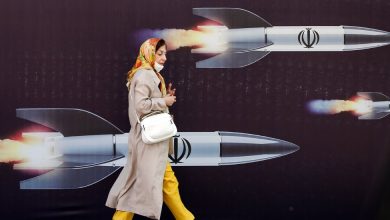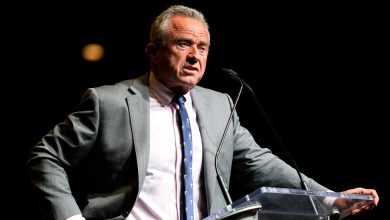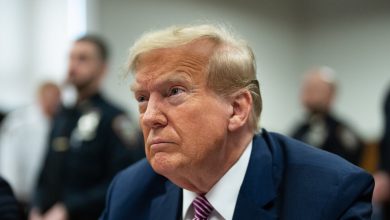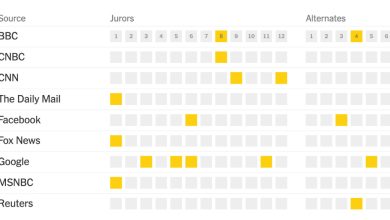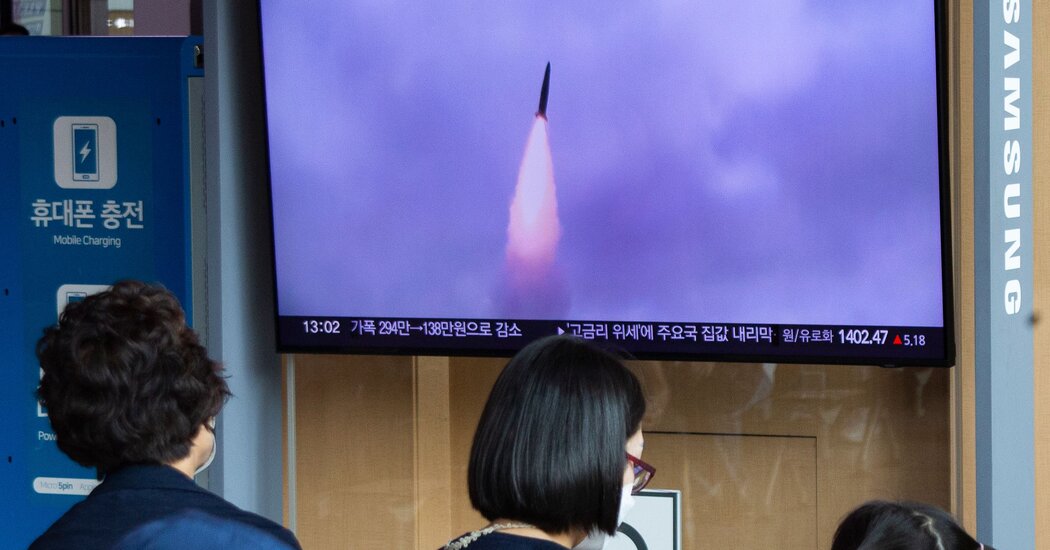
North Korea Launches Two Ballistic Missiles, Fourth Test in a Week
SEOUL — North Korea launched two short-range ballistic missiles off its east coast on Saturday, a day after the United States, Japan and South Korea conducted a rare joint anti-submarine naval exercise.
The missiles were launched from the Sunan District of Pyongyang, the capital of North Korea, and fell into waters off the east coast, the South Korean military said. North Korea has often conducted missile tests from Sunan, the district where Pyongyang International Airport is located.
The country has conducted four missile tests since Sunday, launching a total of seven short-range ballistic missiles. The tests have been seen largely as a response to joint military drills by the United States and its allies in the region.
The navies of South Korea and the United States, including the American aircraft carrier Ronald Reagan, conducted joint exercises off the east coast of the Korean Peninsula from Monday through Thursday. On Friday, the Japanese navy joined them for a trilateral drill to demonstrate their combined ability to detect and track enemy submarines, amid signs that North Korea might be preparing to launch a new submarine it has been building for years and to test its submarine-launched ballistic missiles.
It was the first trilateral drill of its kind since 2017.
South Korea and the United States have conducted annual joint military drills for decades. They were canceled or scaled down under former President Donald J. Trump and former President Moon Jae-in of South Korea to add momentum to their diplomacy with the North’s leader, Kim Jong-un. But when President Biden and the new South Korean leader, Yoon Suk Yeol, met in May, they agreed to reinvigorate the exercises to counter North Korea’s growing nuclear and missile threat.
More on the Relations Between Asia and the U.S.
- Harris’s Asia Trip: What on the surface appeared to be a routine, symbolic visit for Vice President Kamala Harris has become a tricky dance of diplomacy in an increasingly unnerved region.
- South Korea: President Yoon Suk Yeol has aligned his country more closely with the United States, but there are limits to how far he can go without angering China or provoking North Korea.
- China: President Biden signed an executive order designed to sharpen the government’s powers to block Chinese investment in technology in the United States, in a move that is bound to heighten tensions with Beijing.
- Taiwan: Visits to Taiwan by House Speaker Nancy Pelosi and a delegation including Indiana’s governor have exacerbated tensions between the United States, which is seeking to deepen its ties with the self-governing island, and China, which claims Taiwan as its own.
Because of deep-rooted anti-Japanese sentiment among its people, South Korea has been wary of conducting joint military exercises with Japan, even though Washington wants Seoul and Tokyo to cooperate more closely to help deter North Korea. But under Mr. Yoon, South Korea has become more open to such cooperation. In August, the three nations conducted a joint missile warning and a ballistic missile search and tracking exercise off Hawaii, also a first since 2017.
North Korea accuses the United States and its allies of conducting such drills to prepare for an invasion; Washington and its allies call their exercises purely defensive.
North Korea has conducted 22 missile tests this year so far, more than any other year. Officials from both the United States and South Korea have warned for weeks that the country could also restart tests at the Punggye-ri underground nuclear testing site in the northeast of the country. In recent weeks, they have also detected increased activity at Sinpo on the east coast, where North Korea has been testing submarine-launched ballistic missiles since 2015.
Such missiles are one of a series of new weapons Mr. Kim has ordered the North Korean military to develop, as he has vowed to increase his nuclear and missile capabilities “at the fastest possible speed.”
While visiting South Korea this week, Vice President Kamela Harris called North Korea a “brutal dictatorship” and called its missile tests “provocative” and “destabilizing.”
The North Korean missile launch on Saturday came hours before South Korea was scheduled to mark its Armed Forces Day with a ceremony that is expected to include a speech by Mr. Yoon.
“Despite North Korea’s internal weaknesses and international isolation, it is rapidly modernizing weapons and taking advantage of a world divided by U.S.-China rivalry and Russia’s annexation of more Ukrainian territory,” said Leif-Eric Easley, a professor of international studies at Ewha Womans University in Seoul. “The Kim regime is also playing hardball with the Yoon administration while South Korean politics are hobbled by infighting.”

